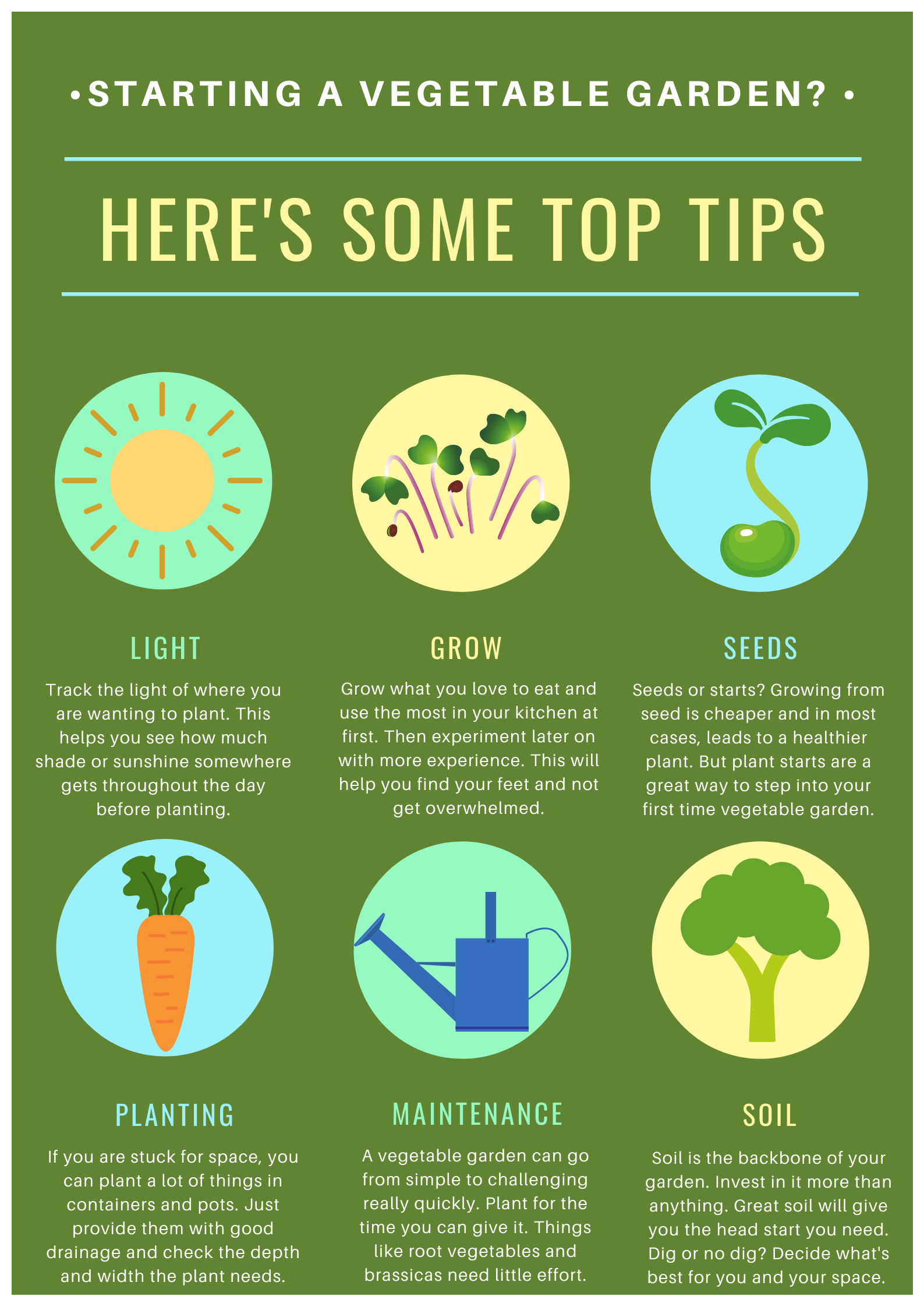Top Tips for Starting a Vegetable Garden
Tips for Starting a Vegetable Garden | The Mother Cooker
Vegetable gardening is one of my biggest passions. I've been doing it for four years now and have picked up some experience along the way. I thought I would put together a simple tip graphic for you to save and keep. The six tips are always things that you should consider before planting a vegetable garden. Let me expand on them a bit for you.
Light
Tracking your light is important before you plant, or in fact even think about buying plants or seeds. It determines exactly what you will be able to grow. Once you know this key factor, you can research into the amount of light a certain plant requires and see if it will thrive in your garden. You can go ahead and buy tomato seeds, but if you cant provide them with at least 6 hours sunlight a day, they wont be as prolific. Plants that provide fruit, as a general rule need full sun. Things like leafy vegetables don't require the energy fruit providers need, so they can survive much better in the shade. This also applies to root vegetables, as they grow under the ground anyway.
GROW
Something people always ask me is 'What shall I grow?' and my answer is always the same, grow what you love to eat. There is no point wasting time and resources growing things that you aren't going to eat. The only time I think you should do that, is if you are going to give the food away to a good cause. If you love to eat potatoes, grow potatoes.
Another thing you should consider is, are you wanting to plant things for production value. Some things can either produce a lot of food or a minimal amount. Things like potatoes, courgettes, beans and often tomatoes generally produce a lot. Whereas if you're going to plant one cabbage seed, you'll get one cabbage and it will take up a lot of space. Space that you could give to something with higher production.
SEEDS
When I first started my vegetable garden, I did it with plant starts. Mainly so I could learn how to look after the plants properly. I think the only seeds I planted were radishes. Don't feel pressured to start with seeds, it is remarkably cheaper in the long run, but knowledge is priceless. Plant starts usually become available in spring, you'll find a lot of vegetables and fruit trees available at most garden centres.
There are a few tips I will give you about plant starts:
Always go for the smaller one, this gives the plant more time to establish in your environment than in a restricted pot.
Look for ones that are healthy and have the least pest damage.
You'll often see that they have more than one plant to a pot or section of a pack. Buy those if the other two points apply, means you'll get more for your money.
Planting
A lot of people think that they can't start a vegetable garden because they don't have a physical garden. I'm here to tell you that it's nonsense. If you have a balcony, a bright windowsill or even a patio that can only fit pots, you can start a vegetable garden. A lot of things can be grown in pots and containers. You can grow cut and come again salad, tomatoes and strawberries in hanging baskets. Carrots and potatoes can be grown in pots or bags. Tomatoes can be planted in grow bags. Peas, beans, onions, garlic...I could go on and on.
Maintenance
Keeping on top of a garden can be a lot of work, especially in the summer when things reach peak production. My main tip here is to not plant so much that you get overwhelmed. I'm in my fourth year and currently have an allotment, three raised beds at home, 15 tomatoes, two sacks of potatoes, fruit trees, fruit bushes...it's a lot. But I can manage it and that's the point. When you are starting out, learning is your main priority. Only take on as much as your spare time will allow. Otherwise you'll become overwhelmed and then things will fail and you'll get sad.
Soil
Soil is the beating heart of your garden. If you are going to try and save money on everything, allow the soil to be your biggest expense. Your soil feeds the plants, which in turn, feed you. Pick the best quality growing medium you can find, especially if you are planting in pots. Of course you can buy simple multi-purpose compost, but this won't hold on to nutrients. Mix in some organic matter like leaf mould or manure. I choose a no-dig approach, meaning I don't till (dig over) my ground. When I started my raised beds, I didn't dig out the lawn I put them on. I simply tipped good quality compost on top of it and let nature do its thing. I then top up that compost every autumn and spring. This lack of disturbance helps the microbes in the soil to become stronger and provide better nutrition for your plants.
If you are planting straight into the ground, I highly recommend that you do a soil test first and amend it according to what it is lacking. This will save a lot of time and money in the future. The last thing you want to do is spend all that money on plants or grow things from seed for them to die in poor soil.
Find all my other gardening tips here.

